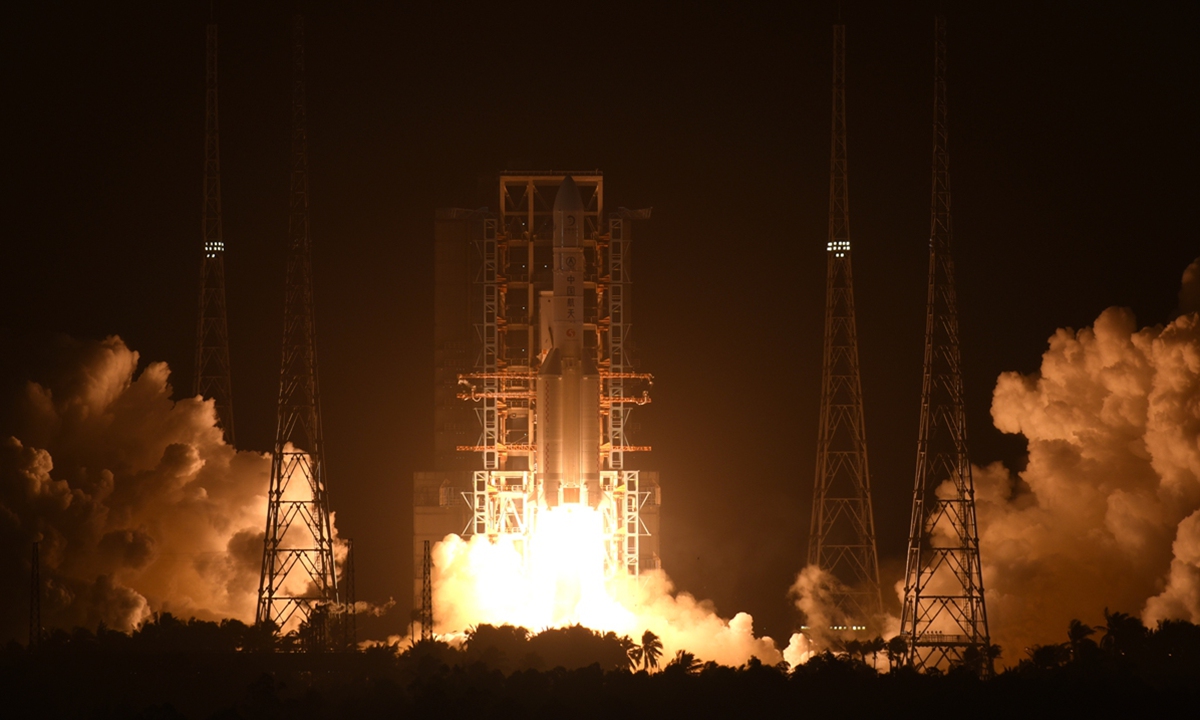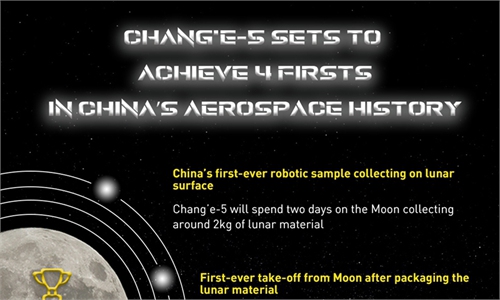
China launches Chang'e-5 mission via Long March-5 rocket to retrieve Moon rocks at Wenchang Space Launch Center from South China's Hainan Province early Tuesday morning. Photo: Li Dike
The Chang'e-5 lunar probe on Tuesday was successfully sent into planned orbit to collect and return samples from the moon, China's first attempt to retrieve samples from an extraterrestrial body. This is a crucial step toward China's aerospace industry. In the next 20 days or so, there will be many "China's first" waiting for the Chang'e-5 mission to create. This task is glorious and arduous.
Outer space is the domain in which human beings will deeply develop in the future. It is also the commanding heights of science and technology. The Earth is too small to have sufficient resources, while outer space contains infinite possibilities. From the perspective of history, human beings may just open the door to science, and everything may have just begun.
As a great power, from the perspective of national interests, the Chinese people's well-being, or the common interests of human beings, we must all contribute to ushering a new era of science and technology. Accelerating the development of aerospace industry is China's best choice.
The US sent its astronauts to the moon 51 years ago. This provides a reference point for China to assess its own space technology development. The gap in this regard cannot be viewed from simply this one angle, but it is indisputable that the gap is wide. Outer space exploration shows the potential of a country's scientific and technological capabilities. Take a look at the Hubble Space Telescope, which has been operating in its orbit, and Voyager 1, a space probe that explores the outer solar system. China has a long way to go.
The stronger the rocket thrust is, the bigger our space dream can be explored. China's biggest rocket is the Long March 5 with a five-meter diameter. Its thrust can help Chang'e-5 fulfill its moon sample-return mission. But if we want to send Chinese astronauts to the moon, we need rockets with a larger diameter and stronger thrust. Both the US and former Soviet Union have rockets at over 10 meters in diameter.
China needs to develop heavy rockets and use them to carry out basic work for outer space exploration. If we cannot realize such breakthrough, we will not be able to stand on the high ground of human science and technology in the future. It will bring long-term strategic problems, like China developing the information industry, but the semiconductor technology is grasped in the hands of other countries.
Most Chinese support the country's continued investment in space technology, but a minority still keeps preaching populism, saying that the investment is "wasteful" and should be used to improve people's livelihood. They even make a sensational scene by comparing the plight of some low-income groups with the achievements of space to appeal to emotion. We have to say this is a short-sighted and frivolous behavior on such serious issues of national development strategy.
China is a latecomer in both economy and science and technology. A firm and sustained catch-up is the only way for China. Unlike other countries which can follow suit, China has to adopt a macro strategy and take the long-term view due to its big size and the uncertainty it faces in the international political landscape. To achieve steady national development is of special significance to China.
It can be seen that the coming decades will not be easy for China, which is also China's destiny as a major developing country. China will keep moving forward and making progress gradually in every sector as the country does not have reason to take a short rest and become smug about its achievements.
It's worth pointing out that two pieces of news have been linked together on Monday and Tuesday. One is that the last nine poverty-stricken counties in Southwest China's Guizhou Province have been officially removed from the poverty list, meaning that all 832 registered poor counties in China have shaken off poverty, ushering in a new era. The other is the Chang'e-5 lunar probe successfully starting its journey to collect Moon samples. This is coincidence. But the two events show the comprehensiveness of China's development and progress from different angles. The exploration of Chang'e-5 is not unsubstantial. Together with the battle against poverty, this reflects the different dimensions of China's people-centered development pattern.
This is no longer the era in which outer space exploration is driven by ideological competition. Emphasis has been replaced on the scientific significance of the exploration. China has no interest in outer space politics. For us, there are only realistic and future national interests, new sources for Chinese people's wellbeing as well as responsibility for the common interests of mankind in outer space. China is most capable of coordinating various interests and missions. It's hoped China's aerospace development will get better and better amid the country's coordinated development of various national courses and become a driving force.

